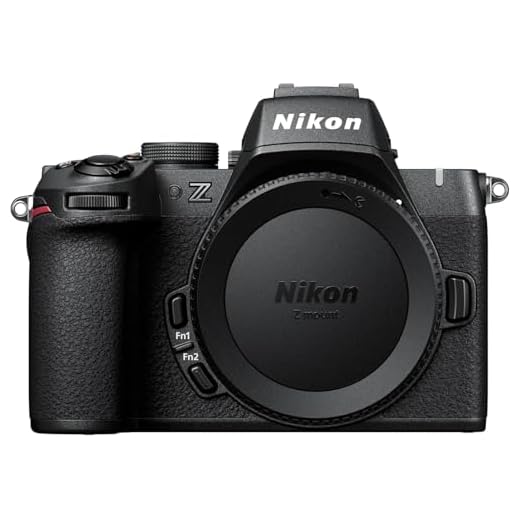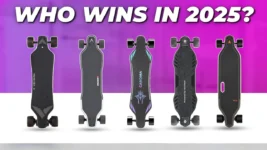Looking for the best Nikon camera in 2025? Then you need to see this guide. We’ve researched and selected the Top 5 Best Nikon Cameras of 2025 that truly stand out this year — offering powerful features, stunning image quality, and great value for your money. All the products mentioned are linked below for easy access.
Everything we recommend





The Nikon Z8 tops our list in 2025 as a full-frame mirrorless hybrid camera that redefines creative possibilities for professionals and enthusiasts alike. Its 45.7-megapixel stacked CMOS sensor delivers breathtaking detail, supporting extended recording of 8K UHD at 30fps for up to 90 minutes and 4K UHD at 60fps for 125 minutes, with 4K/120p for slow motion, as praised by TechRadar for its hybrid prowess. The high-res zoom offers up to 2x reach with prime lenses, and the HEIF format ensures stunning images on HLG-compatible displays, per Cybernews. The sensor’s stacked design minimizes rolling shutter, making it ideal for fast action, per Digital Camera World.
The Z8’s robust magnesium alloy and Cerebo P-Series body is dust- and drip-resistant, ensuring durability in challenging conditions, as noted by PCMag. The 4-axis tilting monitor facilitates vertical playback, and the MC-N10 remote grip enhances solo video operation, per the video script.
Autofocus is exceptional, with 9 subject detection types—including a dedicated airplane mode—and the ability to detect faces as small as 3% of the frame’s long side, a feature unmatched in its class, as highlighted by Amateur Photographer. The real-live viewfinder ensures lag-free shooting, and 12 video and 20 stills focus options excel in backlit scenarios, per Cybernews.
Additional features like pre-release capture at 20fps, the MB-N12 power battery pack for extended life, and warm display options for night shooting add versatility, as noted in the script. The Z8 performs well at high ISOs up to 25,600 with minimal noise, though its 45.7MP sensor can produce more noise than the Z6 III at extreme ISOs, per Digital Camera World. At 910g, it’s heavier than the Z6 III, and its price reflects its pro-grade features, per user feedback on X. For photographers and videographers in 2025 seeking a do-it-all camera with unmatched resolution, video capabilities, and durability, the Z8 is the ultimate choice.
The Nikon Z6 III lands at number two in 2025, a versatile hybrid camera excelling in both photography and videography. Its 24.5-megapixel partially stacked BSI-CMOS sensor enables 6K/60p internal raw video recording and oversampled 4K UHD, delivering exceptional video quality, as highlighted by TechRadar for its impressive hybrid capabilities. It supports 4K at 120fps and Full HD at 240fps for stunning slow motion, with high-res zoom up to 2x in HD and 1.4x in 4K, making it ideal for capturing distant subjects with detail, per Digital Camera World. The sensor’s design minimizes rolling shutter, though it’s not as fast as the Z8’s fully stacked sensor, per Photography Life.
The best-in-class EVF boasts 4000 nits of brightness, 5,760k-dot resolution, and a 120fps refresh rate, offering vibrant, lifelike visuals even in harsh lighting, with a DCI-P3 color gamut for accurate tones, as praised by Amateur Photographer. The wide ISO range of 100-64,000, extendable to 24,800, ensures stunning shots in nearly any light, though high ISO noise is slightly more noticeable than the Z8, per Cybernews. Autofocus, now 20% faster than the Z6 II, excels in low light with reliable subject tracking, including people and animals, as noted in posts on X. The Flexible Picture Control feature lets users create and upload custom color profiles, adding creative flexibility, per TechRadar.
The Z6 III’s magnesium alloy body is weather-sealed, weighing 760g, and includes a fully articulating screen, ideal for vlogging, per Amateur Photographer. It also supports Nikon Imaging Cloud for seamless connectivity, though its 24.5MP resolution may limit cropping compared to the Z8, as noted by Digital Camera World. The 5-axis IBIS ensures steady shots, and the 14fps mechanical shutter (20fps electronic) suits action photography, per Photography Life. For creators in 2025 needing a hybrid camera that excels in both stills and video, the Z6 III offers top-tier performance and versatility.
The Nikon Z7 II secures the third spot in 2025, designed for photographers who prioritize extreme detail and precision in their work. Its 45.7-megapixel backside-illuminated CMOS sensor, without an optical low-pass filter, captures exceptional detail and lifelike colors, as praised by Cybernews for its ability to focus on stunning textures.
The dual EXPEED 6 processors—a first for Nikon—enhance performance, offering faster image processing, a buffer over three times larger than its predecessor, and 10fps burst shooting, though this is slower than the Z8’s 20fps, per Digital Camera World. The sensor’s brilliant dynamic range excels in deep shadows and bright highlights across all lighting conditions, ideal for landscapes and studio work.
The 5-axis in-body image stabilization (IBIS) ensures steady handheld shots, a boon for low-light or telephoto shooting, while the 493-point hybrid autofocus system covers 90% of the frame, with enhanced Eye-Detection AF and a Wide-Area mode for precise portraits and video, as noted by Amateur Photographer. It performs well in low light, though some users on X mention it’s not as fast as the Z8 for action photography.
Video capabilities include 4K UHD at 60p, allowing smooth motion and flexibility in post-production, though it lacks the 8K of the Z8, per TechRadar. The magnesium alloy body balances strength and portability at 705g, and dual memory card slots (CFexpress/XQD and SD) offer flexible storage, as appreciated by PCMag.
Connectivity via SnapBridge enables easy sharing and remote control, though the lack of Nikon Imaging Cloud support, available on newer models like the Z5 II, feels like a miss, per Digital Camera World. The EVF experiences minimal blackout, enhancing the shooting experience, but the 45.7MP sensor can produce more noise at high ISOs compared to the Z6 III, as noted by Digital Camera World. For photographers in 2025 needing a high-resolution powerhouse for detailed stills and reliable video, the Z7 II delivers exceptional value and performance.
The Nikon Z5 II takes the fourth spot in 2025, delivering full-frame power at an accessible price point for creators seeking precision and connectivity. Its 24.5-megapixel BSI-CMOS FX-format sensor, paired with the EXPEED 7 processor, produces high-resolution images with excellent dynamic range, as noted by PetaPixel for its ability to handle diverse scenarios like landscapes and sports.
The camera supports burst shooting up to 30fps in JPEG mode with pre-capture, though its 5fps raw shooting lags behind the Z6 III’s 14fps, per Photography Life. The autofocus system excels, detecting nine subject types—including people, pets, and planes—with low-light performance down to -10 EV, making it ideal for challenging conditions, as highlighted by Digital Camera World.
The electronic viewfinder (EVF) stands out with a brightness of 3000 nits, offering sharp, immersive visuals that outshine many DSLRs, a feature praised in reviews for shooting in harsh daylight. Connectivity is a strong suit, with dual UHS-II SD card slots, Camera-to-Cloud support via Nikon Imaging Cloud for automatic image transfers, firmware updates, and picture control downloads, and SnapBridge for wireless sharing and remote control, per Digital Camera World. However, the lack of a fully articulating screen limits vlogging flexibility compared to the Z6 III, as noted by Amateur Photographer, and the 24.5MP resolution may feel limiting for those needing extreme detail, per user feedback on X.
Despite these, the Z5 II’s 5-axis IBIS ensures steady handheld shots, and its video capabilities, including 4K/30p with a Product Review mode for vloggers, add versatility, as mentioned by TechRadar. The magnesium alloy body balances durability and portability, though some users on X note its price increase over the original Z5 makes it less of a bargain. For creators in 2025 wanting full-frame quality, advanced autofocus, and seamless connectivity without breaking the bank, the Z5 II is a compelling option.
The Nikon Z50 II starts our list at number five in 2025, offering an impressive entry-level mirrorless camera for creators and hobbyists who want quality without the bulk. Its 20.9-megapixel DX-format (APS-C) sensor delivers sharp, detailed images with lifelike colors, even in low light, as noted in reviews from TechRadar for its excellent stills. Weighing just 450g, it’s a travel-friendly option, though the lack of in-body image stabilization (IBIS) means you’ll rely on lens-based VR, a minor drawback for handheld shooting in dim conditions, as mentioned in user feedback on Digital Photography Review.
Creative control is a highlight, with 31 built-in Picture Control presets and the ability to download more via Nikon Imaging Cloud, allowing users to customize and save their own styles—ideal for establishing a unique aesthetic, as praised by ePHOTOzine. The Z50 II shines in speed, offering burst shooting up to 30fps with pre-capture mode and intelligent 3D-tracking autofocus that detects subjects like people, pets, birds, and vehicles, though some reviews note it’s not as decisive as the Z8 or Z9, per Digital Camera World. For beginners, its user-friendly design includes a flip-out touchscreen, smart Auto Mode, and 16 Scene Modes, making professional results accessible, alongside portrait tools like Skin Softening and Portrait Impression Balance for polished shots straight out of the camera.
Video capabilities are robust, with 4K/60p recording, reliable autofocus, built-in slow motion, and streaming-ready features as a high-quality webcam, catering to content creators, as highlighted by PCMag. While the 20.9MP resolution is outdone by some APS-C rivals like the Canon R10, and the lens selection for DX-format is limited, per TechRadar, the Z50 II’s weather sealing and connectivity via Wi-Fi and Bluetooth make it a versatile choice. For those starting their photography journey in 2025, the Z50 II offers a powerful, intuitive package at a competitive price.
FINAL VERDICT
Whether you’re a beginner, a seasoned photographer, or a content creator looking for the next upgrade, Nikon’s 2025 lineup has something for everyone.
If you’re just starting out or want something portable and user-friendly, the Nikon Z50 II delivers great image quality and performance at a budget-friendly price.
And if you’re after the absolute best of the best in Nikon’s mirrorless ecosystem, the Nikon Z8 is a no-compromise powerhouse ready for any challenge.
Still not sure? Think about your priorities — resolution, portability, or video features — and pick the model that matches your creative style.
👉 Related Articles You Should Also Check Out:
- Best Canon Camera of 2025
- Top 5 Best Sony Cameras 2025
- Top 5 Best Smart Rings of 2025
- Top 5 Best Fitness Trackers 2025







